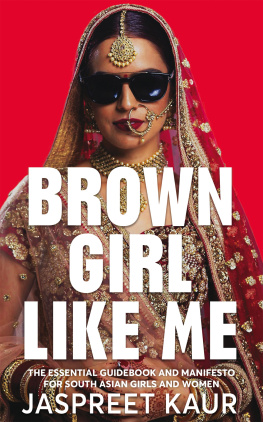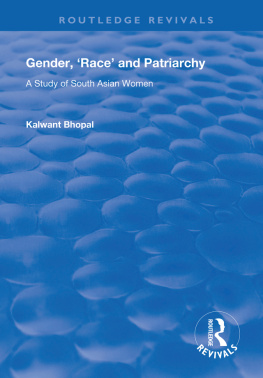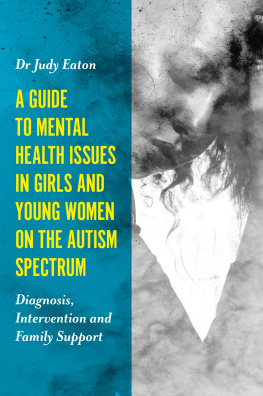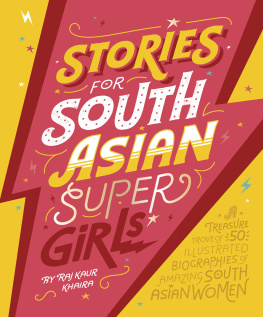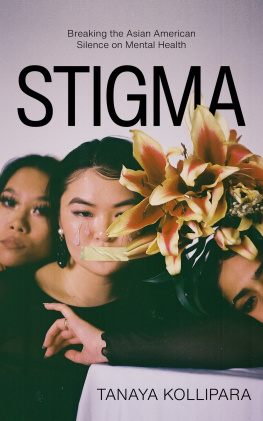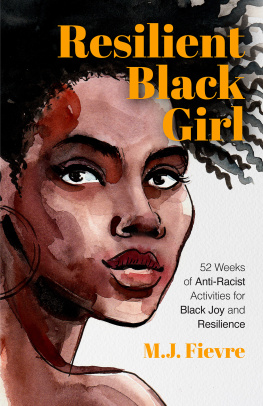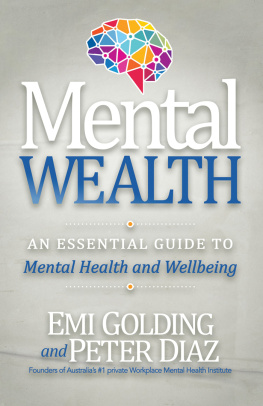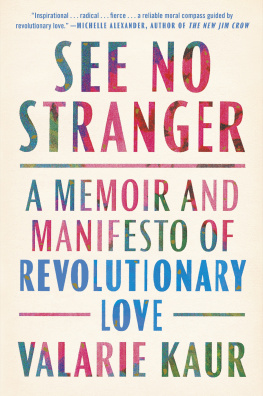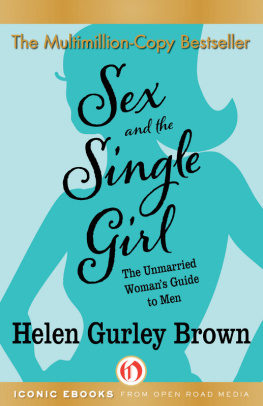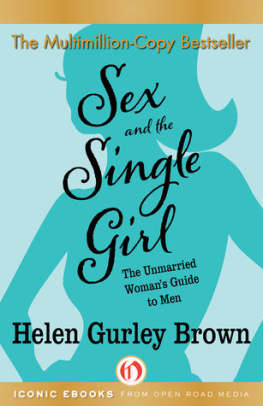
Jaspreet Kaur, also known by her online handle Behind the Netra is an award-winning spoken word artist, history teacher and writer from London. She is passionate about gender issues, taboo subjects and encouraging positive social change in both the Asian community and wider society. Her work tackles issues related to gender discrimination, mental health stigma, the postcolonial immigrant experience, and more. Jaspreet is a regular on the BBC and Sunday Morning Live, and worked with the UN on the HeforShe campaign. She is currently a Research Fellow at Birkbeck Universitys Centre for British Political Life. Brown Girl Like Me is her debut book.
@behindthenetra
INTRODUCTION
Seen and Unseen
Sundays would always mean one thing in my house when I was a kid. Hair-wash day. This ritual is probably one of my earliest memories, me sitting at my mums feet whinging as every knot passed through the comb, followed by a generous amount of coconut oil being rubbed into my head and finished off with a nice, neat plait. This precious time with my mum was a mixture of haircare and storytime. Whilst she nourished my little head and stimulated the blood circulation, Mum would share stories about her childhood, memories of how my grandma would do the same thing for her every Sunday back in their pind near Jalandhar, Punjab. A precious time when women caught up, shared worries and connected to their roots. Literally. But one day, after one of my first days of high school, I stormed home and screamed at my mum to never put oil in my hair again.
Earlier that day, I was unpacking textbooks into my locker out of the huge backpack Dad and I bought from Barking market a few weeks earlier. I say huge because it literally felt like a suitcase, the kind of backpack that (as my brother kindly noted) made me look like a Teenage Mutant Ninja Turtle. It even had wheels... Anyway, as I neatly arranged my lovely new sticky-back-plastic-covered books in my locker, I could hear a group of girls sniggering behind me. Yeah, she always stinks of curry! They were referring to the smell of tarka coming from the blazer that I had left in the kitchen the night before. A smell that no amount of Impulse body spray could mask. And her hair is so greasy, doesnt she ever wash it!? I could feel my cheeks burning with embarrassment. I pretended I couldnt hear them and decided not to turn around. With a snigger and shove, the girls howled with laughter and walked away. Thats why from that day, and to my mums heartbreak, I didnt want to oil and plait my hair ever again.
The act of oiling hair was a bond formed between generations of brown women. The use of natural vegetable oils to nourish both hair and skin has been documented for over 5,000 years in South Asia. I dont think its a coincidence that in Sanskrit, the word sneha means to oil but also to love or give affection. It makes complete sense to me now, the loving act of oiling and nourishing yourself. Fast forward to the present day, and its become an essential part of my self-care Sunday routine, which I now prefer to call hair-wash-Sunday. But why was I so ashamed of something embedded in my culture and roots for such a long time? Is this where I started to internalize some kind of self-hate towards my identity and being a brown girl?
I never recognized my brownness or otherness before this point. My family and I grew up in east London, and like anyone who speaks of their hometown fondly, I would say it was a really special place. When my grandad (Babaji) first came to the UK in the early 1960s, he decided to settle in the East End, moving around from Greenwich to Newham and eventually Ilford. I was born in Barking Hospital, something that my husband always reminds me of every time ting from Barking comes on the radio. The world that I saw, the world that I knew, felt like Ilford Lane, Southall Broadway or Soho Road. In that bubble, I went to school with kids from all walks of life. I grew up with brown friends, black friends, white friends, Jamaicans, Somalis, Turkish, Bengali and Punjabi, and all kinds of communities Jewish, Muslim, Sikh, Hindu, you name it. I had Catholic friends and Sunni and Shia friends. White working-class kids ate their packed lunch with brown working-class kids. As a brown girl navigating these spaces, I may have faced some social and cultural barriers which well come back to shortly, but at least I felt part of the world I knew; normal even. This was the London I knew.
But somewhere in the time between childhood and adolescence I began to deny all of the beautiful parts of what make me a brown girl. I looked around for role models to look up to, or for someone who had gone through these struggles before, but other than the women in my family, I couldnt find any heroes. I started to feel a constant sense of erasure when it came to my lived experiences. Brown female voices and experiences were missing from history books, from positions of power, from the boardrooms and on TV screens except for the infamous Meera Syal and the Goodness Gracious Me team. Maybe thats why I became so obsessed with Princess Jasmine when I was little I had the doll, the lunchbox, the pyjamas, the movie on cassette, the whole shebang! The Middle Eastern representation of her has had scrutiny over the years, and though she wasnt Punjabi, she was my princess. But did getting married and being saved by Aladdin have to be my only aspiration? If anything, I found Aladdin more relatable. You see, there wasnt much to work with as a young brown girl...
What made being a young brown girl so difficult was the constant messaging that my heritage who I was and am was less desirable, fashionable or even legitimate than white Western culture. Eventually, I found myself wanting to deny my own heritage because I was told by society that it had no place here. And with that loss of identity came a lack of self-confidence and self-belief, culminating in me almost losing my entire sense of self. I found myself thinking: where and how do I fit in? I wanted to be white, but I kept thinking what am I up against? Eventually, I had a realization: do I even need to fit in?
Brown women are often seen as docile, quiet and passive, thanks to the orientalization of Asian women: dehumanized and reduced. More recently, new stereotypes have been added to our list of labels, including bombers or bashful brides. Isnt it about time that we controlled our narrative and our voice, so that our representation doesnt just consist of the tropes about victimhood and dowries, degradation and despair? Now, this is not me downplaying violence against women or the much-needed ongoing conversations about forced arranged marriages, FGM, grooming and sexual abuse. But the overreliance on a stereotype means that the only facts we have been given about ourselves have been distorted, causing corruption in what we think we know about ourselves. I felt seen and unseen.
How can we define who we are when weve been handed a dictionary full of lies and half-truths? Isnt it up to us to define who the brown woman is or isnt, rather than anyone else?
I didnt want my identity to be defined by how supposedly oppressed I am. Having that as our only label, our only story, just didnt sit right with me. What about the brown women who have changed history? What about our ancestors who fought in anti-colonial movements, and continuing post-independence groups, battling through struggles around war and militarization, against right-wing fundamentalism and state repression? How about the brown women who lived through partition and displacement, the difficulties of migration and assimilation, and, more recently even, through a worldwide pandemic? All whilst trying to untangle prisms of class, caste, community, religion and gender politics. Bloody hell, brown women are strong. This strength reminds us that daring to speak, daring to fight, daring to even exist in a system not designed for you is an act of resistance in itself. Every day, brown women are resisting, challenging and thriving. But where are their stories? Where are the ordinary stories of the daughters and granddaughters, women like us? How about the brown women who inspired me and helped me love who I am, many of whom youll find in this book?
Next page
